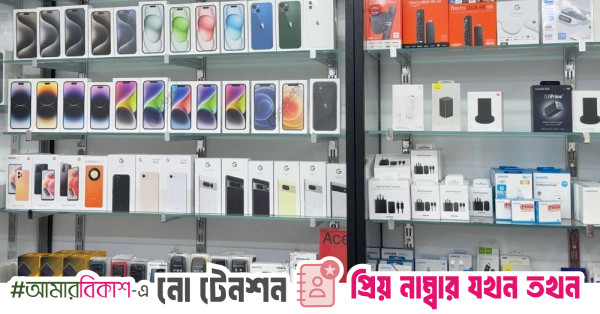As the government prepares to activate the National Equipment Identity Register (NEIR) on 16 December, Bangladesh is bracing for one of the most ambitious and controversial telecom crackdowns in its history.
All unregistered or unofficial (grey) mobile phones will face disconnection after a short grace period.
Supporters call it essential for curbing tax evasion and protecting local manufacturers; critics warn it could paralyse the country’s phone supply, raise prices, and cost lakhs of people their livelihoods.
What is NEIR and why now?
NEIR is a central database that will identify every mobile phone using its IMEI (unique device ID).
Once activated, the BTRC will be able to block any phone that is unregistered, smuggled, refurbished illegally, or IMEI-cloned.
The move is being revived after failed attempts in 2016 and 2021. This time, the effort is backed by local handset manufacturers, who argue that illegal imports are destroying their ability to compete.
BTRC Chairman Emdadul Bari says the purpose is clear: “Our goal is to make handsets affordable and safe.”
How will NEIR work?
- All phones already active on mobile networks will be auto-registered before 16 December.
- Any phone connecting for the first time after 16 December must be manually registered.
- Unregistered phones get a 3-month grace period with SMS alerts. After that, BTRC will begin technical disconnection.
- Users will also be able to register second-hand and gifted phones.
- Bari says BTRC will start “very loosely or very mildly”, tightening enforcement step by step to avoid public hardship.
How big is Bangladesh’s grey phone market?
- Estimates vary, and all of them are huge.
- BTRC: over 60% of phones are unofficial.
- Trader associations: closer to 90%.
- Bangladesh sells 3.2-3.5 million smartphones a month.
- Most of them come through informal channels, often carried in from Dubai, Malaysia, or Singapore.
Why is the grey market so dominant?
In one word: taxes.
- Official imports: 57% cumulative tax
- Local manufacturing: around 35% tax
- Grey market: near-zero tax
This makes official devices nearly double the price of unofficial ones.
Examples:
- Samsung S25 Ultra: Tk236,000 (official) vs approx. Tk105,000 (unofficial with insurance)
- iPhone 17 Pro Max: Tk250,000 (official) vs Tk165,000 (unofficial)
Consumers naturally choose the cheaper route.
Mohiuddin Ahmed of the Mobile Phone Consumer Association sums it up: “The price of officially imported handsets is, in many cases, double. That is why the market has become so large.”
Who supports the NEIR rollout?
1. Local manufacturers
They argue that illegal imports prevent them from competing or recovering investments.
MOIB President Zakaria Shahid says, “This time we hope there will not be any unknown reasons delaying implementation.”
2. Government and BTRC
Officials insist NEIR will curb tax evasion, prevent device cloning and financial fraud, protect local industries, and eventually reduce handset prices.
The BTRC has even asked the government to cut taxes on official imports and local production to make the market viable.
3. Prime Minister’s Office representatives
Faiz Ahmad Taiyeb, the chief adviser’s special assistant on telecom, issued a hardline warning saying, “We cannot make laws by negotiating with smugglers… After NEIR, there will be only black or white, no grey.”
Who is opposed, and why?
1. Retail and wholesale traders
They fear total collapse.
The grey handset sector supports 10–15 lakh livelihoods and over 20,000 shops.
Md Aslam Uddin of the Mobile Business Community says, “If this business is suddenly shut down, they will starve.”
2. Consumer groups
They warn that mobile phone prices could spike sharply, undermining the government’s goal of expanding digital access.
3. Industry analysts
Experts question whether Bangladesh can realistically disconnect millions of devices without causing nationwide disruption.
What happens if NEIR is fully enforced?
Potential benefits:
- Stronger control of illegal imports
- Reduced cloning and fraud
- Boost for local manufacturers
- Possibly cheaper phones in the long term (if taxes fall)
Potential risks:
- Short-term price hikes
- Shock to the country’s largest phone supply chain
- Loss of income for lakhs of small traders
- Reduced access to smartphones for low-income users
- Disruption to the government’s digital transformation goals
Is a 90% shutdown even possible?
This remains the big question.
Even BTRC chairman Bari acknowledges the challenge, “The biggest challenge is handling the terrible suffering that will descend upon people’s lives.”
The commission appears to prefer a soft launch, gradually tightening enforcement while monitoring public response. But the government’s political messaging is far firmer.
Taiyeb warned, “Illegally imported, smuggled, and cloned phones will be shut down. There will be no compromise.”
Bangladesh is attempting to regulate a grey phone market that has grown for 15 years under regulatory tolerance and now dominates national handset supply. If NEIR is implemented gently, with tax reforms and industry dialogue, the move could reshape the market and support domestic manufacturing.
If enforced harshly, it risks triggering a shockwave through the country’s phone ecosystem, affecting millions of users and traders.
16 December will mark only the beginning of this test, not the end.








